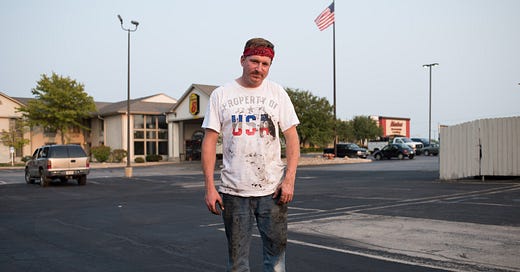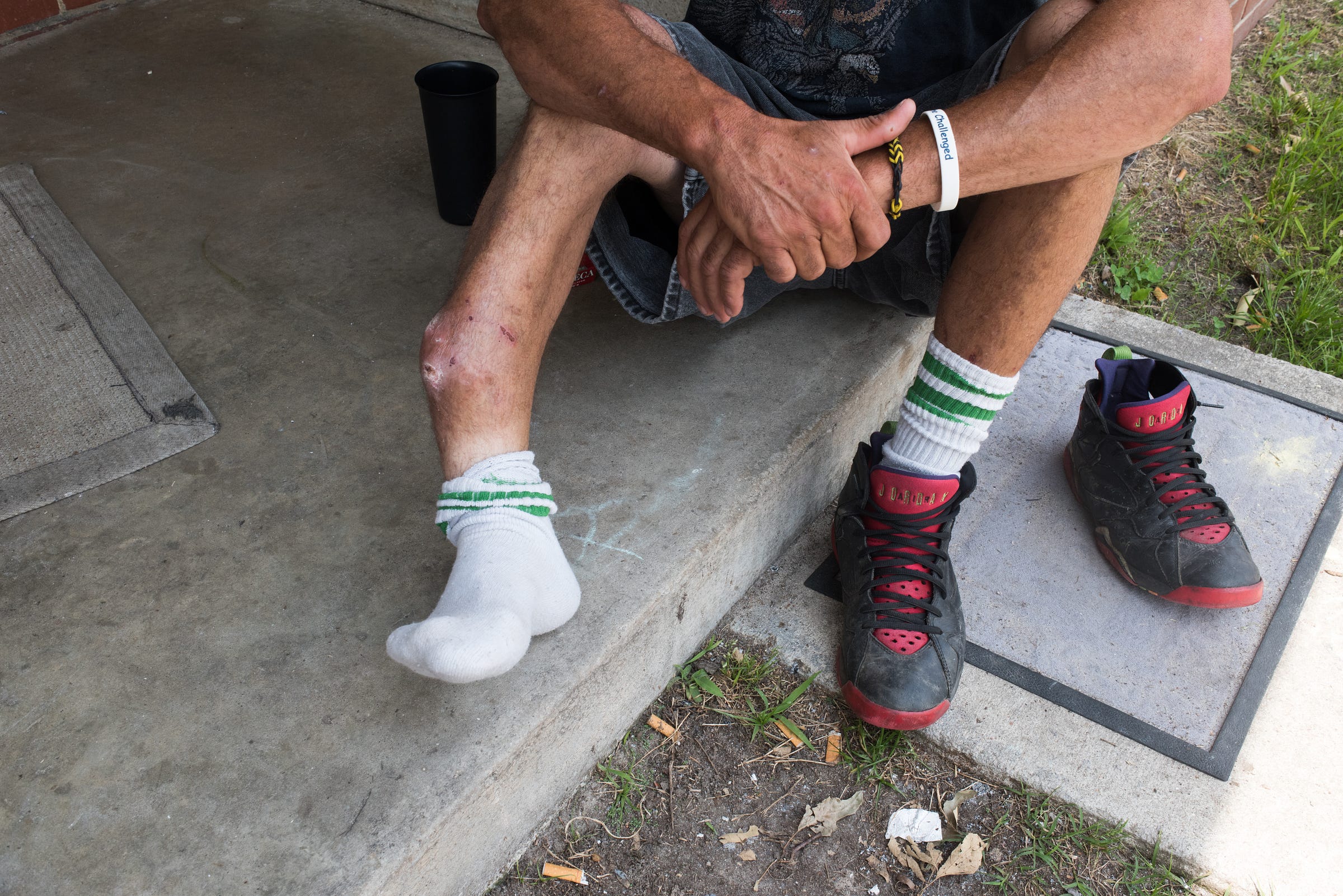For over a decade, from roughly 2008 until 2020, rather than walking the world, I was driving and walking around the US, talking to residents, focusing primarily on neighborhoods viewed by the media as problematic, such as Hunts Point in the Bronx, where I spent four years. The result of that time was my book Dignity, where I did my best to summarize what I saw and learned from those interviews.
I left out a lot of stories that made an impression on me, some for brevity, others for sensitivity, but most because there was no clear and simple “take home lesson” from them.
While writing last week’s post on my aborted trip across America, I was reminded of these, mostly from the last group, which are about people, places, and images, that for reasons I can’t fully explain still linger with me close to a decade later.
So this and my next post will be a grab bag of scenes and interviews from America, which while individually don’t have an intended cohesive point, I hope in aggregate are insightful, or at least thought provoking.
Minnie, Blanca, and Teddy (Lumberton, North Carolina)
Minnie sits on her porch smoking, listening to the TV coming through the screen door. Her porch “ain’t much, just a slab of concrete, but it is shade” and it is brutally hot, even though it is April. Her chair “ain’t much either,” just a plastic one from the Dollar General. “Come to think of it,” she says, “my apartment ain’t much, but it does, best one can expect, cause this is Lumberton and we near the tracks and we in the projects and I don’t go no job right now. Not that I am complaining. I haven’t worked in ‘bout a year since I worked in the factory. That was blistering and sweltering hot work. Didn’t want complications with my pregnancy and stuff, so I quit.”
She is surprised to see me walking around with my camera, but she isn’t so surprised she gets worried or quiet or isn’t polite. She invites me over to talk and when I tell her I want to know about the neighborhood she smiles and pulls out her phone and calls her friend, “There is a reporter here wanting to talk about the projects. Come on over.”
She gets up to go inside for a minute, explaining, “You found me with my boobs out. I want to fix myself to look proper for the camera.” She comes back a few minutes later carrying two more chairs and asks me to sit.
She is talkative, but measured, and asks what I want to talk about and I ask her to tell me a little about herself, and she talks about her dad who was a roofer, about her brothers and sisters, about her mother who worked in a factory and died not long ago, even though she was only fifty-eight.
She doesn’t mention it, but after a few days in Lumberton I can guess from her skin color that she is a member of the Lumbee Tribe. It isn’t a crazy guess, about a third of Lumberton is Lumbee, another third white, and another third black, making it one of the most diverse towns in the US. What unites the three there is poverty; the surrounding county is the poorest in North Carolina.
Millie speaks slowly and unrushed, with quiet pauses between words and sentences, and by comparison I feel rude asking her questions. Her accent is so thick and lyrical she sounds like she is singing in another language, and when I cannot fully make out what she is saying I hold back from asking to repeat, not wanting to be even ruder.
When she is done talking we both sit still looking out on her street, a semi-circle that curves through the neighborhood of identical one-story red-brick homes divided into side-by-side apartments. Nobody else is out, or moving, and there is no other sign of activity.
From about ten houses down her friend comes towards us, holding a plastic cup and a packet of cigarettes. When she sees my camera she smiles, “I didn’t realize pictures were involved. I need to go back to my house and put on my wig and my face.”
When she comes back she introduces herself. Blanca is “a single mother living in the projects.” She sits next to Minnie, and asks what I am writing about. I tell her mostly drugs and she says, “Well you found the correct spot. There always been drugs around here, lots of prostitution, alcoholics, robbing, stabbings, and killing. Just about anything you can think of.” She indicates she doesn’t use, and I ask how she stays away from all the drugs. She says, “Pretty easy. I just stay in the house.”
Like Minnie, she is content to sit and listen, unhurried, and I find myself feeling an obligation to talk to fill in the empty moments. It is an obligation only in my head, since they are in no rush and happy to sit quietly.
We sit listening to the insects and the TV and eventually I get antsy and start asking questions again,
Me: You always live here?
Minnie: Mostly. I lived in Wilmington (NC) for two years. It ate me alive. Had to come back here. Was there by myself, didn’t have no friends or family. Had to come back to my family once I got pregnant.
Me: Why did you go there?
Minnie: I went following my sister who was with a man, and then when I got there I met my man and then I got pregnant and he turned out to be no good and left me alone, so I came back to be with my people here. I did like it when I lived in the big city. It had public transportation. Robeson County here is a trip. Jobs hard to come by. Hard when you don’t got transportation, can’t get around and stuff. No benefits in the jobs here, they just cut you a small check every two weeks.”
(pause)
Not much here for people. It ain’t about what you know it is who you know. To get Tribal benefits you need to know somebody connected.”
Me: You part of the tribe?
Minnie: Yes, I got my card.
Me: Does it mean a lot to you?
Minnie: Yes sir. Being Lumbee is very important. It is my blood. It is my past. It is my ancestors and where I come from.”
(pause)
“Best bet is to graduate high school and go to college and get out of here.”
Blanca: I did go to college for a minute. Up to AT&T University in Greensboro. Didn’t take. I wasn’t focused and I really do regret that.
Me: What did you do when you got back?
Blanca: Focused on raising my child. I guess there are jobs, but not unless you got college.”
I stop asking questions and we sit again watching nothing, smoking, and listening to the TV inside.
After ten minutes Minnie’s brother Teddy comes out of the apartment wearing only blue jean shorts and a do-rag, drinking from a plastic cup. His right leg is jarringly crooked, bent just above the ankle, where a large bump is covered by scabbed skin. He plops down, leaning against the wall, to put on his socks and shoes.
He grimaces, introduces himself, before going back inside to get a shirt and a pack of cigarettes, moving quickly despite his leg. He is used to getting around on it, improvising between hopping, jumping, hobbling, and limping.
He comes back out, plops down again, and I ask him what happened. He answers without a hint of anger or remorse, “Fell off a roof. I used to do roofing for money and fell off one ten years ago and broke my leg. I didn’t have Medicaid or insurance and the first hospital just wrapped it up, said it was broken in three places. They sent me to a second hospital that put a cast on it with no pins or screws. Just a cast. Started bulging out of the cast immediately. Didn’t set right. They told me to go to a different hospital, gave me an appointment for a few weeks later, but they also handed me a bill that put me in debt. I wasn’t gonna go get more in debt. If you ain’t got a good job and don’t got a child, you don’t get no Medicaid or no insurance. Now they tell me to just cut it off. I don’t want to cut it off. I still can still walk.”






